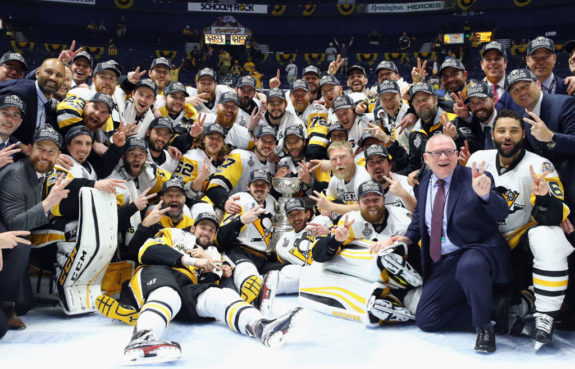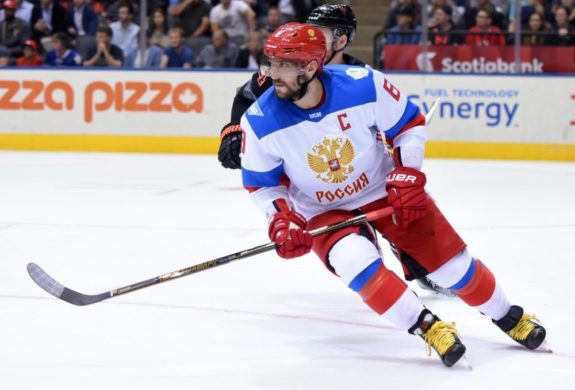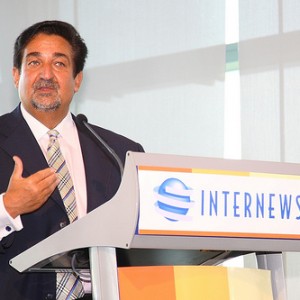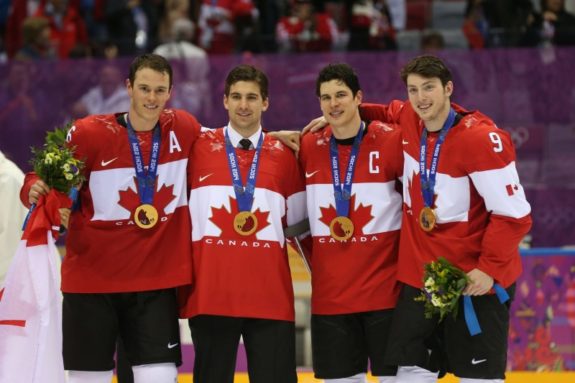We’ve all heard the rumours. Despite the National Hockey League’s decision to take a pass on the 2018 Winter Olympics in Pyeongchang, there are, apparently, a few rebellious players willing to break with official NHL policy and take their talents to South Korea.
Rene Fazel expects a few NHL players to still be present at the Olympics. Yes, Alex Ovechkin is one of them.
— Aivis Kalniņš (@aiviskalnins) August 11, 2017
Naturally, there is sure to be pressure for teams to punish rogue players, from fans concerned with potential lost points in the standings, to the NHL demanding retribution for being made to look silly. Regardless of any team-level discipline, the NHL will undoubtedly provide supplemental punishment for rule-breakers. All this in addition to the social strife that a perceived defection, however brief, might cause in the dressing room.
So just how risky would it be?
Olympic Participation and the NHL
The NHL has explicitly stated that no player under NHL contract – including two-way contracts – shall be permitted to participate in the Olympics (players signed to American Hockey League-only deals are permitted to play in Pyeongchang). So, to be clear, if any NHL players do indeed go to South Korea, they will be in violation of league rules.
Should the NHL choose to pursue supplementary discipline for such actions, the punishment will be at the discretion of NHL Commissioner Gary Bettman (or someone chosen by him). The NHL Collective Bargaining Agreement (Article 18-A.2) states he has three possible courses of action (and can employ “any or all” of them):
a) by expelling or suspending such Player for a definite or indefinite period;
The most likely option. Though expulsion is extraordinarily unlikely, there is a good chance the league will hand down some length of suspension to dissident players.
Whether this is a wise course of action is another story. The NHL would be faced with the decision to either keep star players off the ice or else publicly lose face. For purposes of marketing and fan service, the latter option is a no-brainer. But this is the NHL we’re talking about, so you know they’re going with exactly the opposite of what the fans, media and common sense dictate.

Moreover, if a team has already been missing a star player for three weeks, they aren’t going to be thrilled when said player is held out of further competition by the league. If any pending suspensions have the potential to seriously handicap teams in the standings, look for owners to put pressure on the commissioner to go easy on their boys. Bettman does work for them, after all.
b) by cancelling any SPC that such Player has with any Member Club;
The least likely option. Yes, the league will no doubt be infuriated at players disobeying explicit orders. But these players are assets. The NHL isn’t just going to let them go for nothing.
Can you imagine what would happen if the NHL cancels, for example, the contract of Alex Ovechkin? Think of the publicity when the undisputed greatest goal-scorer of this generation – perhaps even of all-time– is set adrift and opts for the Kontinental Hockey League.

I don’t have faith in the NHL to do much right, but I simply cannot see them cancelling contracts like some sort of toddler throwing a tantrum. Star players are what make this game great – and what make the owners money. There’s just no way.
c) by imposing a fine on the Player not exceeding the maximum permissible fine under Section 18.7(b).
Though the maximum permissible fine is $10,000 – chump change to most NHL players (certainly most of Olympic calibre), the league will likely throw the book at any rebellious parties. Such players would be breaking league rules, so a fine is only fair. Besides, it all goes to a good cause.
NHL Player Appeals Process
Any disciplined player has the right to appeal their punishment by presenting a case to an “Impartial Arbitrator.” Failing this, the National Hockey League Players’ Association can file a grievance.
Should an NHL player receive a suspension for leaving his team and playing in the Olympics, expect a lengthy, drawn-out legal battle that ends up lasting longer than the actual suspension itself. Remember the Dennis Wideman incident?
Olympic Participation and NHL Teams
The CBA is the legal document under which the NHL and NHLPA work together to provide us, the fans, with the spectacular on-ice product we see nearly every night. Yes, they also provide us with the Colorado Avalanche, but hey, nobody’s perfect.
NHL Legalese
As “Member Clubs” of the NHL, teams have disciplinary mechanisms of their own when it comes to dealing with wayward players. Take the Standard Player’s Contract (SPC), for example.
Section 4
The Club may from time to time during the continuance of this SPC establish reasonable rules governing the conduct…of the Player…For violation of any such rules or for any conduct impairing the thorough and faithful discharge of the duties incumbent upon the Player, the Club may impose a reasonable fine upon the Player…The Club may also suspend the Player for violation of any such rules…Copies of the rules referred to herein shall be filed at the main offices of the League and the National Hockey League Players’ Association (“NHLPA”).
Section 6
…The Player…agrees that the Club shall have the right, in addition to any other rights which the Club may possess, to enjoin him by appropriate injunctive proceedings…from playing hockey for any other team and/or for any breach of any of the other provisions of this SPC.
Section 14
The Club may also terminate this SPC upon written notice to the Player (but only after obtaining Waivers from all other Clubs) if the Player shall at any time:
a) fail, refuse, or neglect to obey the Club’s rules governing training and conduct of Players, if such failure, refusal or neglect should constitute a material breach of this SPC.
b) fail, refuse or neglect to render his services hereunder or in any other manner materially breach this SPC.
Translation of NHL Legalese for Human Beings
So basically, individual teams can bar players from playing in the Olympics, both via legal mechanisms, and via the threat of fines and or suspensions. In extreme cases, SPCs can even be cancelled (though I think we can all agree this will not happen).

Whether any of these measures will actually be enforced is another story. If you’re running an NHL team in the thick of a playoff race, you’re no doubt annoyed one (or more) of your best players hasn’t been around for three weeks. Are you really going to keep this player out of the lineup for longer and potentially risk further harm to your team? If so, what will that do to your relationship with the player? With the team? With the media? With the fans?
I would imagine most teams will try and play the nice guy to the NHL’s bad cop, claiming that, though they would love for their players to participate in the Olympics, they are subject to the NHL’s decisions and, thus, have no say in the matter.
Of course, if enough players from enough teams end up going, said teams will no doubt attempt to pressure the league into limiting suspensions for Olympic participation, if not withholding them altogether. The owners choose Gary Bettman to run their league for them. If the owners have concerns, Bettman has to listen.
Olympic Participation and the NHL Dressing Room
On the personal side of things, an NHL player has a responsibility, day in and day out, to the nearly two-dozen other people in the dressing room. It would be a crushing blow to a team’s psyche if one or more of its best players takes three weeks off at a critical time. With points at a premium and ever-increasing parity, who could blame those left behind for feeling jilted?
What if that three-week absence is the difference between making and missing the playoffs? Between buying and selling at the trade deadline? Between going for it all and blowing it up? It would be hard, from the perspective of players and staff alike, not to feel betrayed.
Here’s Hoping NHL Players Play
The Olympic debate is a frustrating one; there’s fault on all sides. The NHL should welcome any chance to market the game – and the league, especially to fans who’ve not been exposed to it. The International Olympic Committee should be willing to share in the profits (or, at the very least, allow the NHL to use video of its own players, for goodness’ sake). The NHLPA should have ensured Olympic participation was guaranteed in the CBA.
Of course, once again, the people who really get screwed are us, the fans.

Here’s hoping there are some brave souls within the ranks of NHL teams, players willing to ignore the possible consequences for a chance to represent their country on the world’s biggest stage. Here’s hoping the tournament is, as it should be, a best-on-best event. Here’s hoping the players realise the strength of their position and give a giant middle finger to the frustratingly short-sighted, inexplicably self-assured, and outright vindictive NHL.
But NHL players are NHL players; a mysterious, honour-bound subsection of the population with a vehement aversion to doing anything that might, in any way, rock the boat. As much as they may grumble, I think the players are staying home.
But no one will be happier than I if they don’t.